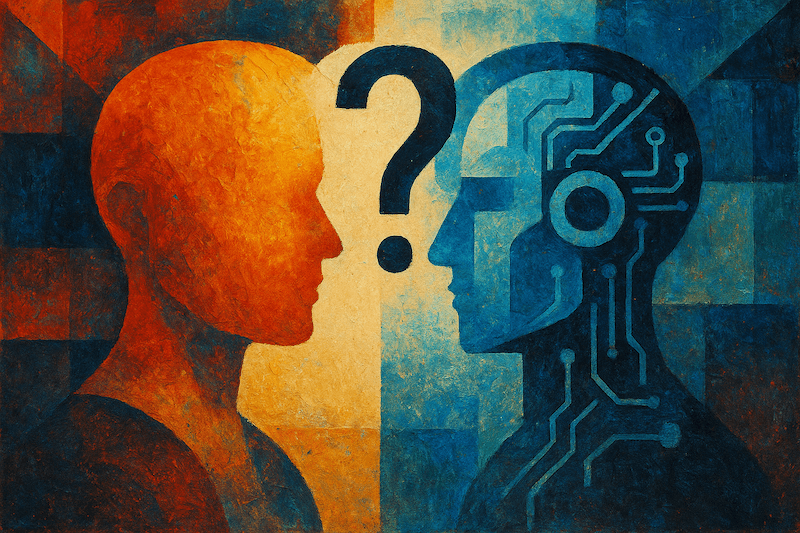
"Why remember something when you can just Google it?" That phrase used to feel like a harmless joke. But as more of our thinking is handed over to tools like ChatGPT, Gemini, and other AI systems, people are starting to ask a serious question: Are we forgetting how to think for ourselves?
AI helps us do things faster—write emails, solve problems, get ideas, even understand our feelings. But experts are warning that the more we rely on AI to think for us, the less we're using our own minds. And like any muscle, the brain can weaken when it's not used.
Are We Getting Less Smart?
Researchers have noticed something strange in recent years. After decades of rising IQ scores (a trend known as the "Flynn effect"), scores in many countries have started to fall—especially among teenagers. A study by the OECD found that students today are doing worse in reading, maths, and science than they were just 10 years ago.
Many things may be causing this: less reading, more screen time, even changes in diet or education systems. But one thing is clear—technology, including AI, is changing the way we think.
"We shouldn't just blame AI," says Dr. Meera Patel, a brain researcher at King's College London. "But we also can't ignore the fact that we're letting it do more and more of our thinking."
Skipping the Thinking Part
A recent study from Switzerland tested 800 people who use AI tools regularly. It found that although they completed tasks faster, they did worse on follow-up questions that required deeper thinking. In short—they were relying on AI to get the job done but weren't really learning.
It's a bit like using a calculator every day and then forgetting how to do basic maths without it.
Young people, especially, seem to be affected. A UK survey of students aged 14–18 found that 70% used AI for homework, but fewer than 15% felt they really understood the material afterward.
"Students tell me they don't want to think too hard," says Fiona Walters, a teacher in Birmingham. "They say, 'Why bother when ChatGPT can do it for me?'"
What About Creativity?
Some people argue that AI can actually boost creativity—and in some ways, it does. Artists, designers, and writers use AI to spark ideas or get inspiration. One study from MIT showed that people using AI could come up with more ideas, faster.
But there's a catch. Many of those ideas were less original than ones created by humans alone. "We're getting more output," says Dr. Aisha Rahmani, one of the researchers, "but not necessarily better output."
Over time, if everyone uses the same tools to think, we risk ending up with ideas that all sound the same.
Are We Too Trusting?
Another problem is trust. A 2024 study found that people are more likely to believe false information if it's written by AI—especially if it sounds smart or confident. The scary part? The more someone uses AI, the more likely they are to trust it without question.
"It's not just that the information is wrong," says Dr. Alan Shore, an ethics expert. "It's that we stop checking if it's right."
Should We Be Worried?
This doesn't mean AI is all bad. It saves time, boosts productivity, and opens new possibilities in science, medicine, and education. But the way we use it matters.
If we let AI do all the thinking, we may lose the ability to solve problems on our own. And that could be dangerous in the long run.
"We need to use AI wisely," says Dr. Carla Mendes, a neuroscientist. "Let it support your thinking, not replace it."
Some countries, like Finland and South Korea, are already teaching "AI literacy" in schools—teaching kids how to use AI and how to question it. The goal? Help students stay curious, ask better questions, and think deeply—even in a world full of instant answers.
Don't Let the Machines Think for You
AI is here to stay. It's not going away. But just because something is easy doesn't mean it's good for us.
Psychologist Robert Sternberg puts it like this:
"Convenience can make us lazy. And laziness kills growth."
So maybe the real question isn't: What can AI do for us? Maybe it's: What are we still willing to do for ourselves?
Looking Forward
As we continue to integrate AI into our daily lives, it's crucial to maintain a balance between leveraging technology and preserving our cognitive abilities. Here are some practical steps we can take:
- Practice active learning instead of passive consumption
- Set aside time for deep thinking without AI assistance
- Use AI as a tool for verification rather than initial problem-solving
- Encourage critical thinking in education at all levels
- Develop healthy habits around technology use
The future of human intelligence doesn't have to be a story of decline. By being mindful of how we use AI and actively working to maintain our cognitive abilities, we can ensure that smarter tech leads to smarter humans, not the other way around.
Follow Kohminds for more insights on technology, AI, and their impact on human development.
About the Author
